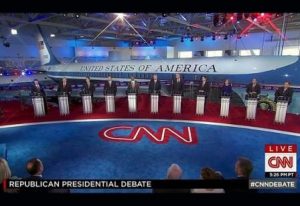As we track the 2016 U.S. presidential primary debates, I am keeping an eye on any utterings by the candidates and their campaigns about the African continent.
Also, as we witness the events, there are those who are scratching their heads in awe at the nasty dramatization of American democracy.
The people who know this best think it’s full of fantasies and fiction.
So, for more than three hours on September 17, we heard plenty of talk about Planned Parenthood, abortions, immigration, as well as claims about the dangers of vaccines, etc. In the debate which focused partly on foreign policy, the Republican field of the top 11 candidates forgot that there is another world out there.
They may have tackled some global issues but the underpinnings of the discussions centered on China, Russia, Iran, and its nuclear program.
On the subject of foreign policy, USA Today’s Ledyard King thinks Marco Rubio deserves credit for his foreign policy credentials. As the writer states, “When he wasn’t blasting China for cyber attacks and for building artificial islands in the South China Sea — “the most important shipping lane in the world” — he was assailing Russian President Vladimir Putin for “threatening to destroy and divide NATO.”
Yet, the African continent was not even mentioned once. Not even a whisper.
Washington Post: The world is facing a devastating global refugee crisis. The GOP debate ignored it.
Why didn’t someone make a connection to something taking place in the African continent or the rest of the developing world, to the myriad of issues that were being discussed? The answer is simple. There are no nukes there that threaten U.S. national security interests and which the Republicans would like to bomb.
What else?
In an editorial, the day after the debate, The New York Times castigated the candidates in what it called Crazy Talk at the Republican Debate. The Times states:
“Despite an abundance of serious issues to talk about, nobody offered solutions to problems like child poverty, police and gun violence, racial segregation, educational gaps, competition in a global economy, and crumbling infrastructure.”
With that, let’s jump to the so-called undercard debate which happened earlier in the day.
In that debate, South Carolina’s Lindsay Graham, a member of the U.S. Senate, managed to throw in a statement in response to a question about Hillary Clinton. Graham uttered the following response.
“I thought Secretary Clinton did a good job when it came to dealing with our problems in Africa, particularly among women. George W. Bush set $40 billion aside and Rick Santorum helped him and President Bush wiped out an entire — wiped out AIDS and malaria for an entire generation of young African children.”
So why is all this important you might ask? Does it make a difference if someone said something about the African continent, the developing world or not? Yes of course Africa is important, and how else would you know unless it is expressed in speech. What we heard the most from so-called hawkish Republicans was their intent to use pressure, not diplomacy, to bully or bomb their adversaries into submission.
One of these candidates will end up winning the GOP primaries and will face a Democratic challenger in November 2016, whoever that person will be. If they win the U.S. presidency, their policies, for good or for bad, will affect not only the U.S. but the rest of the world, including the African continent.
Today, there are concerns that should Hillary Clinton, the supposed Democratic front-runner, falter, a Republican wingnut might end up as the leader of the free world. Robert Kutter with the liberal American Prospect magazine thinks such a scenario is likely this election cycle.
More than this, let’s not forget that there are plenty of poor people in the U.S. who need help and that there are developing countries around the world that need support from America.
A change of the seasons
This aside, the campaigning and debating continue, and it’s a long way to November 2016. As things progress, changes will become evident.
David Axelrod, a CNN political commentator and former senior advisor to U.S. President Barack Obama states that the seriousness is going to emerge later. Using the analogy of dating and the changes that come with the seasons, Axelrod writes for the CNN website:
“Fall officially begins Thursday. The leaves will begin to change — at least in Iowa and New Hampshire. The tests will become harder, the voters more focused on long-term relationships.
Maybe the summer romances will endure, the beguiling outsiders will evolve to meet the heightened challenges and this already strange year will defy past experience.”
Read More:
CNN: Lindsey Graham shines at undercard debate
Washington Post: Lindsey Graham tops the undercard debate, but Donald Trump dominates

